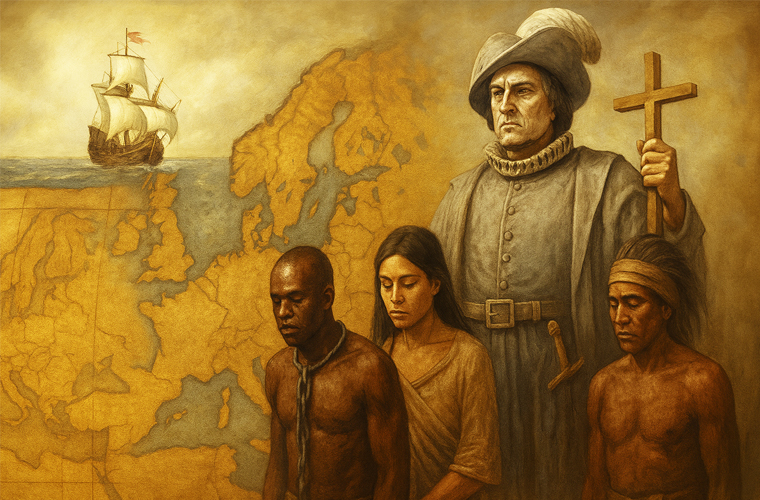A Case for Immigration as Historical Reckoning
Europe’s history is indelibly marked by centuries of colonial expansion, during which powers like Britain, France, Spain, Portugal, and others dominated vast swaths of Africa, Asia, the Americas, and the Middle East. From the late 15th century through the mid-20th century, these empires extracted resources, imposed cultural dominance, and inflicted profound suffering on colonized populations. This era saw the enslavement of millions, the spread of diseases that decimated indigenous peoples, environmental degradation, and the creation of ethnic rivalries that persist today. In this article, I argue that the current wave of illegal immigration into Europe can be viewed as a form of poetic justice—a “payback” for the historical injustices inflicted during colonialism. While this perspective is contentious, it draws on patterns of migration that mirror colonial routes in reverse, reflecting the long-term consequences of exploitation. However, to provide a balanced view, I’ll also address counterarguments, acknowledging that immigration is a complex issue influenced by modern geopolitics, economics, and humanitarian concerns.
The Scale and Sins of European Colonialism
European colonialism wasn’t just about exploration; it was a systematic enterprise of conquest and control. By the 19th century, European powers had colonized nearly 90% of the world’s land surface outside Europe itself. The British Empire alone spanned a quarter of the globe at its peak, while France controlled much of West Africa and Indochina, and Belgium’s brutal rule in the Congo led to millions of deaths. Impacts included:
- Economic Exploitation: Colonies were stripped of wealth—gold, spices, rubber, and labor—to fuel Europe’s industrial revolution. This left many regions impoverished, with infrastructures designed solely for extraction rather than local development.
- Human Atrocities: Slavery transported over 12 million Africans to the Americas, with European powers profiting immensely. In India, British policies exacerbated famines that killed tens of millions. Indigenous populations in the Americas faced genocide-level population declines due to disease and violence.
- Cultural and Social Disruption: Colonialism imposed European languages, religions, and systems, eroding local identities and sowing divisions that fuel conflicts today, such as in the Middle East post-Ottoman partitions.
These actions created global inequalities that endure. Many argue that without this history, the Global South wouldn’t face the poverty, instability, and climate vulnerabilities driving migration now.
Current Immigration: Echoes of the Past
Today, Europe grapples with significant illegal immigration, often from former colonies or regions destabilized by colonial legacies. In 2024, the EU recorded approximately 239,000 illegal border crossings, with top nationalities including Syrians (around 21,000), Egyptians (21,800), and Tunisians (18,000)—many from areas once under French, British, or Italian influence. The Mediterranean route, a deadly path for migrants, saw over 264,000 irregular entries in 2023, with thousands perishing at sea. Overall, Europe saw about 4.5 million immigrants in 2023, including 1 million unauthorized.
This influx isn’t random; migration routes often reverse colonial paths. Africans from former French colonies head to France, South Asians to the UK, and North Africans to Italy and Spain. Proponents of the “payback” view, including some commentators, frame this as karmic retribution: Europe sowed instability abroad and now reaps demographic shifts at home. For instance, conflicts in Syria and Libya trace back to colonial borders and interventions, pushing people toward Europe. In this light, immigration isn’t an invasion but a consequence—Europe’s “evil past” catching up, as the user puts it.
Demographic trends amplify this: Europe’s native populations are declining, with all countries below replacement fertility rates (around 2.1 children per woman needed for stability). Immigrants fill labor gaps, but their arrival challenges cultural homogeneity, which some see as deserved disruption after centuries of imposing European culture elsewhere.
Why This Could Be Seen as “Well-Deserved” Payback
The argument for immigration as justice rests on moral reciprocity. Europe profited from exploiting others; now, those from exploited regions seek opportunities in Europe. As one opinion piece notes, “It’s payback time against the colonialists,” highlighting how ignoring colonial roots ignores the root causes of migration. Debates, like those featuring commentator Douglas Murray, often confront this directly: critics claim immigration is retribution for imperialism, forcing Europe to confront its history.
Moreover, reparations discussions—centered in Africa and the Caribbean—call for compensation, but immigration offers a grassroots alternative: access to the wealth built on colonial spoils. A generous immigration policy could even serve as a partial rectification for past wrongs, as explored in ethical analyses.
Counterarguments: Why This View Falls Short
While compelling, the “payback” narrative has flaws, as voiced by critics across the political spectrum. Not all European countries colonized extensively—Central and Eastern Europe, like Poland or Hungary, had minimal involvement, yet face immigration pressures. Punishing modern Europeans for ancestors’ sins ignores generational distance and individual innocence.
Economically, immigration benefits host countries: immigrants contribute to growth, fill jobs, and pay taxes, countering claims of “taking jobs.” Unauthorized migration is neither heroic nor justified by history; it’s often driven by current wars, poverty, or trafficking, rather than deliberate revenge. Framing it as payback risks oversimplifying: many migrants are refugees fleeing non-colonial issues, like climate change or authoritarianism.
Critics argue that it perpetuates division, ignoring how the end of colonialism brought independence and development aid from Europe. Ethically, two wrongs don’t make a right—illegal immigration strains resources, leading to deaths and social tensions without addressing root injustices.
Europe’s colonial past was undeniably evil, creating imbalances that fuel today’s migrations. Viewing immigration as “deserved overrun” offers a provocative lens, highlighting historical accountability. Yet, as sources from all sides show, this is subjective—media biases often amplify one narrative over another. True justice might lie in reparations, fair trade, or global equity, not unchecked borders. If you’re writing this article, expand with personal anecdotes or interviews, but ground it in facts to substantiate your opinion.

